|
'We walked the talk':
Sri Lanka on the right path to economic growth
By Shirajiv Sirimane
If a Sri Lankan goes overseas and returns after about six months or
if a tourist visits Sri Lanka after a long time, they would observe
massive and rapid infrastructure development taking place in the island.
|
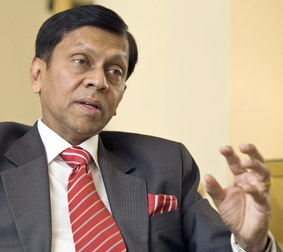
Central Bank Governor Ajith Nivard Cabraal |
They will also experience the phenomenal changes that have and are
taking place in the economy.
These have all being made possible, firstly due to ending the 30-year
terrorism through the world’s biggest humanitarian operation and also
due to political stability.
Governor, Central Bank, Ajith Nivard Cabraal, speaking at the 25th
Anniversary Convention of the Association of Professional Bankers on the
theme ‘Sri Lanka’s Peace Dividend and Recipe for Growth and Stability’
drove this point home and added that in the post-2009 economy, Sri Lanka
recorded many important milestones.
“Per capita income doubled to reach over US$ 2,900 in a relatively
short period, thereby elevating the country to an 'emerging market
economy' status; the economy grew to a robust US$ 59 billion, from about
US$ 24 billion in 2004. Inflation was controlled at single-digit levels
for more than four and a half years; poverty levels reduced to around
six percent from about 15 percent. Unemployment reduced to less than
four percent; the quality of infrastructure was enhanced to a level
comparable with many emerging market economies.
“Foreign reserves were maintained at over six billion US dollars;
public debt was managed prudently so as to reduce the debt-to-GDP ratio
from a high of 105 percent in 2003 to about 78 percent. An over eight
percent economic growth was achieved in 2010 and 2011. Private foreign
investment inflows have exceeded seven billion US dollars. The Fiscal
deficit was limited to 6.4 percent in 2012, from a high of 9.9 percent
in 2009. The country’s Doing Business global rank reached the 81st
position, up from 102nd in 2010,while being poised to jump about 10
places this year. Regional development has made tangible progress and
the Western Province's share of the GDP reduced to around 43 from 51
percent in 2005. Regular foreign investment has flowed into banks and
the stock market; the banking system was maintained in a stable
condition even in the midst of difficult global circumstances,” Cabraal
said.
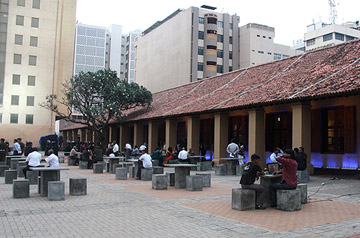 |
| The
refurbished Dutch Hospital complex |
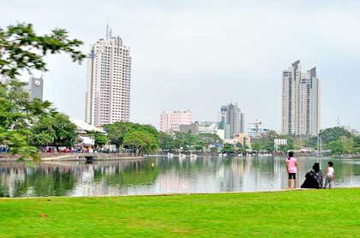 |
| A much
attractive city |
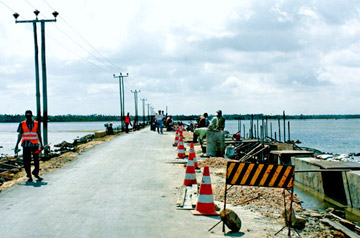 |
| Development
activities under way in the North |
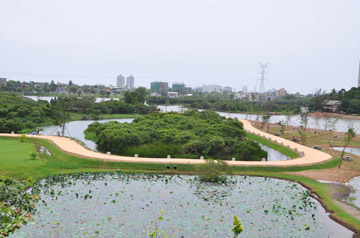 |
| Colombo is now
clean and green |
“Needless to say, the collective efforts that we have all put
together to improve and sustain the positive outlook for our nation have
ensured a conducive investment atmosphere. In that regard, the stable
inflation and the comparatively lower interest rate regime prevailing
today serves as important supports to businesses, by reducing the risk
factors.
Peaceful environment
“Moreover, the country’s peaceful environment, complemented by
political stability, has been able to ensure the continued safety of
investments, while providing a reasonable yield. In this context, the
robust investment framework along the lines of the ‘5+1’ hub concept,
has now opened out new ventures in promoting maritime, aviation, energy,
knowledge and commercial sectors, while tourism is emerging as a further
thrust industry with great promise.”
He said that many special initiatives were taken over the past
several years at various times, to fashion and support this
transformation.
“That list of 'have dones' is therefore an impressive one. But, we
would be the first to admit that, that is the past. The challenge now
would be as to what more we should do in our journey into the future.
How do we become a US$ 100 billion economy? How do we proceed beyond the
US$ 4,000 per capita income level? How do we ensure that we do not fall
prey to the deadly ‘middle-income trap’ that has snared many countries
in the past? How do we ensure that our transformation is sustainable and
long-lasting? How do we maintain the momentum? In short, what is the
'recipe' that Sri Lanka must have for growth and stability, in the next
decade and beyond?” he asked.
“There were several key ingredients in Sri Lanka’s long-term growth
and stability recipe”, he said. “First, the maintenance of sound macro
fundamentals and the continuous movement of those macro fundamentals in
a positive and benign direction.
“What that would mean, in a practical sense, is that we will have to
maintain inflation at low and stable levels for the next decade. That
would, in turn, mean that the demand side management would have to be
carefully anticipated and managed, while the required interventions in
the supply side will also need to be promoted and encouraged.
“Those efforts would also have to be supported by ongoing
improvements in productivity, with the resulting benefits influencing
the exchange rate as well. Businesses will have to become more
productive, competitive and efficient, and the overall expansion of the
economy through new fronts, particularly the five hubs and tourism,
would need to continue in a focused fashion,” he said.
“By constantly improving our enabling environment and economic
structures, as well as by ensuring that the private sector stays
vibrant, motivated and well financed, the economy should be able to
consistently grow at over seven percent per annum, and in certain years,
even exceed eight percent.
“By maintaining such a momentum, our economy would become more
resilient and diversified, thereby enabling us to face whatever new
risks that could emerge from an unpredictable global environment.”
Sustaining seven percent growth
Cabraal further said, “Secondly, Sri Lanka would need to attract
regular capital from outside our shores to bridge our current savings or
investment gap so as to sustain the over seven percent growth momentum.
In the past, some persons have been preoccupied with the notion that
foreign direct investments and investments into the Government are the
only channels through which foreign savings could enter our country.
“However, we have taken a broader view, and we believe that our
savings/investment gap could be bridged through several sources in
addition to the traditional sources.
“As a result, we have encouraged foreign inflows into the banking
sector, foreign inflows into the stock and corporate bond markets, and
foreign inflows as loan capital into eligible businesses.
“Thirdly, we need to continuously ensure the stability of the
financial system. In this regard, the banking and the NBFI sectors, as
well as the insurance sector would play very important roles, and over
the next few years, we are keen that a consolidation takes place in
these sectors, in order to have strong institutions within these
sectors.
“Fourth, the country will have to sustain its poverty reduction
strategies as well as continue with strategies that are designed to
foster balanced regional growth.
“Over the past four and a half years, an enormous investment has been
made in the North, which has resulted in the Northern Province reaching
a reasonable parity viz-a-viz the other provinces.
“This has been an amazing achievement, and I believe we have now set
the stage for a more gradual improvement of all provinces, so that we
could bring all the provinces closer to the standard of the Western
Province, which has already comfortably surpassed a US$ 4,000 per capita
income.
“Therefore, the stage is now well set for the constant upgrade of a
variety of services at provincial level, and the effective integration
of all areas of the country, with better roads, technology,
communication, business services and banking services.
“Such improvements would serve to reduce provincial disparities, and
thereby allow the country to achieve its ambitious goal of less than
three percent poverty by 2016.
“At the same time, as a result of the fast-tracked development of the
provinces, we could probably reach a situation where the GDP
contribution from the advanced Western Province would only constitute
around 33 percent by 2025.
“Such an outcome would indicate a sustained revival of the eight
lagging provinces, which collectively accounted for less than 50 percent
of the GDP contribution in 2005.”
Kolombata Kiri, Gamata Kekiri
“Accordingly, if within the 20 years from 2005 to 2025, the Western
Province's share of the country’s GDP could be reduced from one-half to
one-third, I believe we would be well on track to balanced regional
growth, while also not depriving the Western Province of the fruits of
rapid development.
“Such a transformation would mean that the cry which led to two
bloody revolutions, namely Kolombata Kiri, Gamata Kekiri would just be a
slogan comfortably relegated to the dustbin of history.
“Fifth, we would need to enhance the productivity levels of the
country, whilst also managing the migration of a large work force from
the current traditional sectors to some of the new sectors that are
opening out in our economy.
“Over the next few years, large numbers of youth and other skilled
persons would need to form the new backbone of the labour force that is
needed for the five hubs and tourism, as well as in some of the other
growth sectors such as health and education.
“Where would this new workforce come from? Obviously, some will need
to migrate from the agricultural sector, while others would need to
shift from their present activities to the new areas of activities.
“Sixth, Sri Lanka must continuously improve its global rankings. As
is well known, our country had been lagging behind in the world scene on
many fronts, mainly as a result of our focus for nearly 30 years being
on just keeping body and soul together in the face of the deadly
terrorist threats.
“As a result, until a few years ago, our global rankings were quite
dismal and low. However, about two years ago, we started an initiative
to carefully examine the criteria that is used to rank countries in
relation to various indices, and taking the necessary steps to improve
in each of these areas, and prove to the world that we really mean
business! I believe if our efforts continue to prove successful over the
next few years, and Sri Lanka materially improves its global rankings on
many business indices, we would stand out as an economy with great
promise and potential. That would also help us to be well-positioned to
truly gain recognition as a global hub.”
High norms of democracy
“Seventh, Sri Lanka would need to show progress of its political
stability on a sustained basis, over the next several years. As we all
know, high norms of democracy have been maintained and peaceful
conditions exist in our country, compared to many other countries.
However, strong negative publicity has been drummed up by certain
segments of the Sri Lankan Diaspora, through which such groups have been
able to portray Sri Lanka as a country with political and human rights
deficiencies.
“Unfortunately, the massive progress Sri Lanka has made in recent
years with regular elections, terrorism and violence-free conditions,
rapid economic development, large-scale investments, large numbers of
newspapers, TV and radio stations publishing and beaming news almost
every second without any censorship whatsoever, have not been given
sufficient credit internationally, as a result of the outside world
being bombarded with the false claims by these anti-Sri Lanka forces.
“Although the efforts of these inimical groups are gradually losing
steam in the face of the Sri Lankan political structures being
continuously strengthened, there is, however, a vital need for Sri Lanka
as a country, and for all Sri Lankans as individuals, to work towards
developing our external image on a continuous basis.
“What then is our next challenge? In my view, the special ingredients
that I have so far spoken of, as well as the other elements that are
needed to develop a good economy, namely, basic common sense, good
timing, sound policy mix, sensible political considerations, continuous
well-being of the people, would all need to be generously used as
flavours in the preparation of the final dish of growth and stability.
We would also need to maintain the balance of all the ingredients at the
right 'temperature' if the outcome is to be right”.
In conclusion, Cabraal said that Sri Lanka has so far progressed with
the promise, because we have “walked the talk”. |

